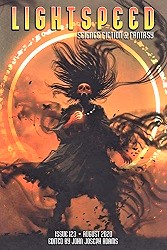“All Those Guardians of Order and Clarity, None of Them Can Abide a Free Witch” by Benjamin Rosenbaum
“Still You Linger, Like Soot in the Air” by Matthew Kressel
“The Bone Stag Walks” by KT Bryski
“Sing in Me, Muse” by Katherine Crighton
Reviewed by Tara Grímravn
Eight stories grace the pages of August’s Lightspeed Magazine #123. Four of these are originals and thus the focus of this review. The others are reprints yet still well worth a read, especially if you’ve not read them before.
“All Those Guardians of Order and Clarity, None of Them Can Abide a Free Witch” by Benjamin Rosenbaum
Maghd, also known as the White Witch of Ilmak Dale, has endured a life of abuse and neglect at the hands of her neighbors. Of course, one wouldn’t know that, had they read the story written down by a djinni, told to him by Marish, a local man. He claims to have been out hunting rabbits only to return to find his wife and child gone, the village in smoldering ruin. He blamed Maghd, of course, and spun a fanciful tale for the djinni, detailing the destruction and woe she allegedly left in her wake and complete with him playing the hero’s part in many an act of derring-do in an attempt to make her pay. Now, Maghd is here to set the record straight and tell you what really happened and why.
The voice with which the narrator speaks is quite entertaining. It makes the story fun to read. The constant repetition of full names, like that of the djinni who wrote down Marish’s tale, gets a little tedious. Still, I liked the style. This tale of revenge (and what a lovely revenge it was) is quite enjoyable with a fantastic ending I didn’t see coming. I definitely recommend this one!
“Still You Linger, Like Soot in the Air” by Matthew Kressel
Not long ago, Gil’s lover and pupil, Demi, passed away after a night of passion. Heartbroken, he blames his goddess, Muu, for stealing the one thing that made him feel alive. Now, Muu has sent a new student named Tim to his doorstep, recently arrived from another planet. Tim is intelligent, perceptive, and keen to partake in the jisthmus ceremony that will let her commune with the gods. But the loss of Demi is too fresh, and Gil isn’t sure whether he can face his goddess again.
Overall, I quite liked this bittersweet love story. While I found the constant repetition of the names in nearly every sentence of the first few paragraphs distracting, once past this hurdle, the story takes off. The ending is sad but beautiful at the same time. It’s a wonderful read.
“The Bone Stag Walks” by KT Bryski
Her parents dead, little Liese has recently come to live with her grandmother in a tiny shack in the forest. In the village, she hears the folk whisper among themselves that it’s a shame a young child like her must stay with such a cold and cruel woman, especially with tales circulating of when the old woman’s brother disappeared so many years ago. At night, when the snow lies thick on the forest floor, Liese hears the tapping of the Bone Stag’s hooves on the roof. Her grandmother warns her to stay away from the windows lest it gobble her up. But there’s far more to the Bone Stag than meets the eye.
Bryski’s story is beautifully crafted. I’d venture to say it’s the best of those presented in this issue, as far as I’m concerned. There’s certainly a horror element to it coupled with the fantasy that just makes for a genuinely fascinating read. I especially like how the reader is given insight into what’s happening incrementally through the eyes of the stag, the grandmother, and Liese. I found that this structure ramped up the tension in this decidedly unsettling tale. This is a story you don’t want to miss.
“Sing in Me, Muse” by Katherine Crighton
Floating on a dark sea, Anisah sings to a mother she never knew while on watch duty. Both she and her sister, Tara, however, sing songs that sometimes vary from the ones they’re expected to sing. Then, one day, Tara is gone, taken by others aboard the ship potentially to the farm, and the sinister implication is made that she’s been killed. This causes Anisah to question the songs they’ve been told to sing, putting herself in danger as well.
I’m going to start by cautioning readers against going into this story assuming they’ll find the usual straight-forward tale. This is a difficult narrative to summarize simply because it’s quite abstract, and the plot is almost entirely hidden by metaphor—and not in a very engaging manner. It’s a bit tedious, to be honest. As a result, it requires a bit of work to tease out the actual tale. Eventually, it’s revealed that we’re dealing with space travelers who’ve left Mother Earth to find a new planet and the songs they sing are transmissions that may or may not be reaching any living ears.
Unfortunately, I didn’t care for this story. It feels rambling, non-sensical, and leaves too many questions unanswered to come to any kind of a satisfactory conclusion. For a space traveler, Anisah is unbelievably naïve even in terms of knowing what kind of vessel she’s on. It just doesn’t seem believable that she’d mistake space for a literal sea or stars for fisherman’s floats. And for what reason was Tara killed? Just for non-conformity? Again, this seems unbelievable at best.
 Lightspeed
Lightspeed